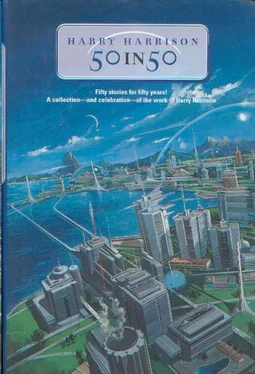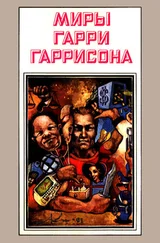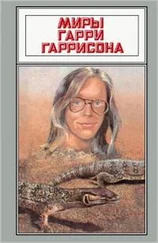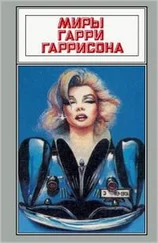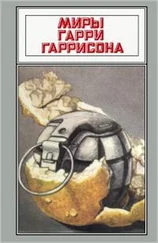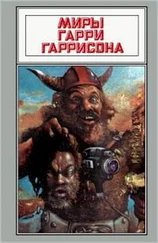Гарри Гаррисон - 50 in 50
Здесь есть возможность читать онлайн «Гарри Гаррисон - 50 in 50» весь текст электронной книги совершенно бесплатно (целиком полную версию без сокращений). В некоторых случаях можно слушать аудио, скачать через торрент в формате fb2 и присутствует краткое содержание. Жанр: Фантастика и фэнтези, на английском языке. Описание произведения, (предисловие) а так же отзывы посетителей доступны на портале библиотеки ЛибКат.
- Название:50 in 50
- Автор:
- Жанр:
- Год:неизвестен
- ISBN:нет данных
- Рейтинг книги:5 / 5. Голосов: 1
-
Избранное:Добавить в избранное
- Отзывы:
-
Ваша оценка:
- 100
- 1
- 2
- 3
- 4
- 5
50 in 50: краткое содержание, описание и аннотация
Предлагаем к чтению аннотацию, описание, краткое содержание или предисловие (зависит от того, что написал сам автор книги «50 in 50»). Если вы не нашли необходимую информацию о книге — напишите в комментариях, мы постараемся отыскать её.
50 in 50 — читать онлайн бесплатно полную книгу (весь текст) целиком
Ниже представлен текст книги, разбитый по страницам. Система сохранения места последней прочитанной страницы, позволяет с удобством читать онлайн бесплатно книгу «50 in 50», без необходимости каждый раз заново искать на чём Вы остановились. Поставьте закладку, и сможете в любой момент перейти на страницу, на которой закончили чтение.
Интервал:
Закладка:
The nurse put the phone down, frowning.
"I've checked and what you say is true, Mr. Dalgreen. I won't put it in my report if that's what you want." She helped him up.
The moon was out of his thoughts later as one canvas after another swam into his vision. He bathed his senses in the collected art of the ages. This was his life, and he was enjoying it to the utmost, trying to make up for his year's absence from the world. The Greek marbles soothed his mind and the Rembrandt portraits wakened his interest once again. He marveled at the fact that after all the years he could still wander through these halls and have his interest recaptured. But he also wanted to see what the moderns were doing. The elevator took him to the Contemporary Wing.
Almost at once, his quiet enjoyment was broken by the painting. It was an autumn landscape, a representative example of the Classic-modern school that had been so popular for the last few years. However, it had something else: an undefinable strangeness about it.
His legs were beginning to tremble again, — he knew that he had better rest for a few minutes.
Brent sat on the wide lounge on the main staircase, cracking his knuckles, his mind whirling in circles as he rapidly introspected himself into a headache. There was no one thing in that painting that he could put his mental finger on, but it had upset him. It was disturbing him emotionally; something about the picture didn't quite ring true. He knew there was a logical evaluation of a painting, just as there Was a logical evaluation of any material object, but that wasn't the trouble, he was sure.
Equally, there was an emotional evaluation — more of a sensation or feeling; and this was where the trouble lay. Everyone has felt pleasure or interest at one time or another when looking at any form of visual ajrt. A magazine photo, drawing or even a well-designed building could generate an emotional pattern. Brent was attempting to analyze such a sensation now, a next-to-impossible job. The only coherent thought he could muster on the subject was: "There is something subtly wrong with that picture.”
Suddenly he had the answer. It came in a second, as if revealed by some hidden source of insight. Perhaps his recent stay on the moon helped the idea to form; it had a relationship to things he had experienced there. It brought to mind the cinder plains that had never felt the foot of man. The sensation could be expressed by one word— "alienness."
In the eternal lifelessness of the silent lunar wastes this^ensation had a place. But how did it get into the polite autumn landscape? What twist in the mind of the painter enabled him to capture this strange feeling on canvas? Brent cursed himself softly. This wasn't a painting of an alien landscape. It was an autumn-in-the-woods landscape painted by a man who didn't understand his topic. A man with an odd way of looking at things. A painter who could look at the bustling life of a fall day and capture the eternal death of a lifeless satellite.
Brent leaned forward on his cane, his heart beating in tempo with his swirling thoughts. He had to find this artist. He would talk to him, reason with him — beat him if necessary… he must find out the man's secret. The thought of his coming death sat like a cold black weight in his body. To die without knowing how to capture that sensation on canvas!
He had killed himself searching for it — to no avail. Yet all the time here on Earth was the man who had the knowledge he sought. The bitter irony of it swirled his head with madness.
The insane thoughts seeped away slowly. He sat on the couch until he was rested enough to trust himself on his feet. He had to find the man.
Down in the right-hand corner of the picture in the shadow of a rock was the signature, " Arthur Di Costa.” printed with wide, sweeping strokes. Brent had never heard the name before but this fact was not unusual in itself. Real artists were a retiring crew. They labored in backrooms and old garages, filling canvas after canvas for their own satisfaction. Their work might never be shown until long after they were dead — dead.
That word kept intruding in his thoughts. He turned angrily and walked towards the guard who leaned casually on a sworl of abstractionist sculpture.
"Shore, mister," the guard answered. "You'll find the curator in his office — the door there behind them old hangings."
"Thanks," Brent muttered, and followed the course indicated by a meaty finger. He found an alcove partially concealed by the luxurious draperies. It contained a photoelectric water fountain and a neomarble door bearing the legend G. ANDREW KINNENT — CURATOR, CONTEMPORARY WING. He pushed open the door and stepped into the receptionist's office. She looked up from her typewriter.
"My name is Brent Dalgreen; I would like to see Mr. Kinnent."
"Not the Mr. Dalgreen! Why I—" The girl broke off, flustered. She leaned hard on the intercom button.
"Go right in, Mr. Dalgreen. Mr. Kinnent will be very happy to see you."' But the lovely smile that accompanied the statement was wasted on him, — his thoughts were elsewhere, today.
After thirty minutes of shop talk Brent drew the conversation around to the present exhibit — and one painter in particular.
"Mr. Di Costa is one of our most brilliant young painters, yes, indeed," the curator said smugly as if he had personally taught Di Costa every painting trick he knew. "He has only lived in New York a short while, but the boy has made quite a name for himself already. Here, let me give you his address, I'm sure you would enjoy meeting him. Common interests, you know."
Brent was easily talked into accepting the information he had come for in the first place. He kept his real thoughts secret from the vociferous Kinnent. They would seem more than foolish — unsupported as they were by a single shred of real evidence. He couldn't let this deter him. The sands of his life were trickling out, but there was something he had to do first.
The building was one of a hundred identical greenstone structures that had lined the streets in the fashionable Thirties. The site of the former garment center was now one of the most favored residential districts in the city. Brent stood across the street from number 31, ostensibly studying the headlines on the newsvend machine. The windowless exterior gave the obvious fact that the owner was fairly well off financially. Any information he sought would be inside — not outside. He crossed the street and stepped into the chrome entrance-way.
The inductance of his body actuated the automatic butler and the soft mechanical voice spoke from over the door.
"The Di Costa residence. May I serve you?"
"Mr. Brent Dalgreen to see Mr. Di Costa."
"I'm sorry, but I have no information regarding you, sir, if you care to leave a mess—" The robot tones stopped with a sharp click, to be replaced by a man's voice.
"I am very happy to greet you, Mr. Dalgreen. Won't you please step in?"
The door swung quietly open to reveal a small wood-paneled vestibule. It wasn't until the door closed again that Brent recognized it as an elevator. There was a feeling of motion and the end wall slid back to reveal a book-lined sitting room. The occupant turned from his desk and stepped forward.
Brent took the proffered hand — at the same time trying to penetrate the man's smile. Di Costa was taller than Brent with a thinness that seemed to contradict his graceful movements. They shook hands, and his hand had the same qualities: thin, long and strong. At this point Brent realized he was staring; he hastened to respond to his host's hospitality.
"I hope you will excuse my just dropping in like this, Mr. Di Costa. I have seen some work of yours at the Metropolitan, and found it, well, very interesting."
Читать дальшеИнтервал:
Закладка:
Похожие книги на «50 in 50»
Представляем Вашему вниманию похожие книги на «50 in 50» списком для выбора. Мы отобрали схожую по названию и смыслу литературу в надежде предоставить читателям больше вариантов отыскать новые, интересные, ещё непрочитанные произведения.
Обсуждение, отзывы о книге «50 in 50» и просто собственные мнения читателей. Оставьте ваши комментарии, напишите, что Вы думаете о произведении, его смысле или главных героях. Укажите что конкретно понравилось, а что нет, и почему Вы так считаете.
